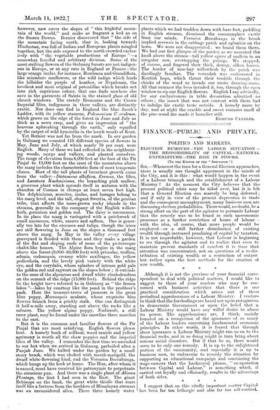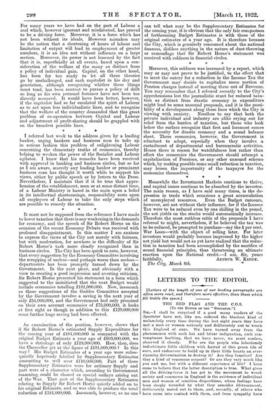FINANCE—PUBLIC AND PRIVATE.
POLITICS AND MARKETS.
ELECTION RUMOURS—THE LABOUR SITUATION— THE RESPONSIBILITY OF CAPITAL—NATIONAL EXPENDITURE—THE RISE IN STOCKS.
[To THE EDITOR 01 TUE " 8PECTATOR."]
Sta,—Whenever the time for a General Election approaches, there is usually one thought uppermost in the minds of the City, and it is this : what would happen in the event of a Labour triumph and the establishment of a Labour Ministry ? At the moment the City believes that the present political crisis may be tided over, but it is felt that a General Election can scarcely be long deferred ; and if only in view of the present depression in trade and the consequent unemployment, many business men are discussing election probabilities. There would, no doubt, be a strong effort on the part of the agitator to persuade Labour that the remedy was to be found in such uneconomic processes as a further restriction of hours of labour— with the idea, of course, that more people would be employed—or a still further distribution of existing wealth through increased penalizing of capital by taxation. It is not improbable, however, that Labour is beginning to see through the agitator and to realize that even to maintain present standards of comfort it is time that. attention was concentrated, not on questions of a re-dis. tribution of existing wealth or a restriction of output but rather upon the best methods for the creation of new wealth.
Although it is not the province of your financial corre- spondent to deal with political matters, I would like to suggest to those of your readers who may be con- cerned with business activities that there is one practical consideration which arises out of these periodical apprehensions of a Labour Ministry. I venture to think that the forebodings are based not upon antagonism to democratic Government or upon the belief that a Labour Ministry would have any wilful desire to abuse its power. Thb apprehensions are, I think, mainly founded on a recognition of the ignorance .of so many of the Labour leaders concerning fundamental economic principles. In other words, it is feared that through sheer ignorance a Labour Ministry might run us on to the financial rocks, and in so doing might in turn bring about serious social disorders. But if that be so, there would seem to be only one remedy. It is up to the enlightened portion of the community, and especially it is up to business men, to endeavour to remedy the situation by supporting an educational campaign and convincing the wage-earners that the hackneyed phrase, "co-operation between Capital and Labour," is something which, if carried out loyally and efficiently, results in the advantage of both sides.
I suggest that on this vitally important matter Capital has been far too lethargic and also far too self-centred. For many years we have had on the part of Labour a zeal which, however ignorant and misdirected, has proved to be a driving force. Moreover, it is a force which has not been without its ideals. However mistaken may be the notion that a shortening of hours of labour and limitation of output will lead to employment of greater numbers, it is an idea not without influence on a large section. Moreover, its power is not lessened by the fact that it is, superficially at all events, based upon a con- sideration of the welfare of the many as distinct from a policy of individual gain. Capital, on the other hand, has been far too ready to let all these theories go by unchallenged, and each capitalist in his day and generation, although recognizing whither these things must tend; has been content to pursue a policy of drift so long as his own personal fortunes have not been too directly menaced. It would have been better, however, if the capitalist had so far emulated the spirit of Labour as to act upon less individualistic lines, and to recognize that the welfare of the country demanded that this great problem of co-operation between Capital and Labour and adjustment of profit-sharing should be grappled with on the broadest possible lines.
I referred last week to the address given by a leading banker, urging bankers and business men to take up in serious fashion this problem of enlightening Labour concerning the elementary truths of economics, thereby helping to weaken the power of the Socialist and Labour agitator. I know that his remarks have been received with approval in banking and business circles, but so far as I am aware, scarcely any leading banker or prominent business man has thought it worth while to support his views, either by public speech or by letters to the Press. Nevertheless, I maintain that if it be true that appre- hension of the establishment, soon or at some distant time, of a Labour Ministry is based in the main upon a belief in its intellectual shortcomings, responsibility rests upon all employers of Labour to take the only steps which are possible to remedy the situation.
It must not be supposed from the reference I have made to lower taxation that there is any weakening in the demands for economy, and the speech of Sir Robert Home on the occasion of the recent Economy Debate was received with profound disappointment. In this matter I am anxious to express the views of the City not merely with fairness, but with moderation, for nowhere is the difficulty of Sir Robert Home's task more clearly recognized than in business circles. The City has been quick to note, however, that every suggestion by the Economy Committee involving the scrapping of useless—and perhaps worse than useless— departments has been promptly turned down by the Government. In the next place, and obviously with a view to creating a good impression and averting criticism, Sir Robert Home presented his statement in a form which suggested to the uninitiated that the next Budget would include economies totalling £181,000,000. Now, inasmuch as those suggestions of the Geddes Committee accepted by the Government involve a saving in the next year of only £54,000,000, and the Government had only promised on their own account economies of £75,000,000, it looks at first sight as though in addition to this £129,000,000 some further huge saving had been effected.
An examination of the position, however, shows that if Sir Robert Home's estimated Supply Expenditure for the coming year of £484,000,000 is compared with the original Budget Estimate a year ago of £603,000,000, we have a shrinkage of only £119,000,000. How, then, does the Chancellor get at the figure of £181,000,000? In this way ! His Budget Estimates of a year ago were subse- quently hopelessly falsified by Supplementary Estimates amounting to well over £110,000,000. Part of these Supplementary Estimates were for ordinary Supply and part were of a character which, according to Government reasoning, could be classed as special outlays arising out of the War. That part of the Supplementary Estimates relating to Supply Sir Robert Home quietly added on to his original Estimate, and so was able to produce the total reduction of 1181,000,000. Inasmuch, however, as no one can tell what may be the Supplementary Estimates for the coming year, it is obvious that the only fair comparison of forthcoming Budget Estimates is with those of the original estimates of a year ago. It is therefore because the City, which is genuinely concerned about the national finances, dislikes anything in the nature of dust-throwing or camouflage that Sir Robert Home's statement was received with coldness in financial circles.
Moreover, this coldness was increased by a report, which may or may not prove to be justified, to the effect that to meet the outcry for a reduction in the Income Tax tho Government may decide to capitalize some portion of Pension charges instead of meeting them out of Revenue. You may remember that I referred recently to the City's apprehensions lest the journalistic stunt for reduced taxa- tion as distinct from drastic economy in expenditure might lead to some unsound proposals, and it is the possi- bility of a development along these lines which the City is viewing with anxiety. Needless to say that both the private individual and industry are alike crying out for relief from the burden of taxation, but those who look below the surface recognize that first and foremost comes the necessity for drastic economy and a sound balance sheet. These economies, however, the Government is reluctant to adopt, especially when they involve a curtailment of departmental and bureaucratic activities. Hence there is reason for watchfulness lest rather than effect the economies the Government should attempt a capitalization of Pensions, or any other unsound scheme which, by making possible some small reduction in taxation, may lessen the importunity of the taxpayer for the economies themselves.
Meanwhile the Investment Markets continue to thrive, and capital issues continue to be absorbed by the investor. The main reason, as I have said many times, is the de- pression in trade which occasions a great accumulation of unemployed resources. Even the Budget rumours, however, are not without their influence, for if the Income Tax were to be reduced even by one shiffing in the pound, the net yields on the stocks would automatically increase. Therefore the most ruthless critic of the proposals I have referred to might, nevertheless, if he believed the tax was to be reduced, be prompted to purchase—say the 5 per cent. War Loan—with the object of selling later. For later investors would probably become impressed by the higher net yield but would not as yet have realized that the reduc- tion in taxation had been accomplished by the sacrifice of sound financial principles, thus threatening an ultimate reaction upon the National credit.—! am, Sir, yours



































 Previous page
Previous page